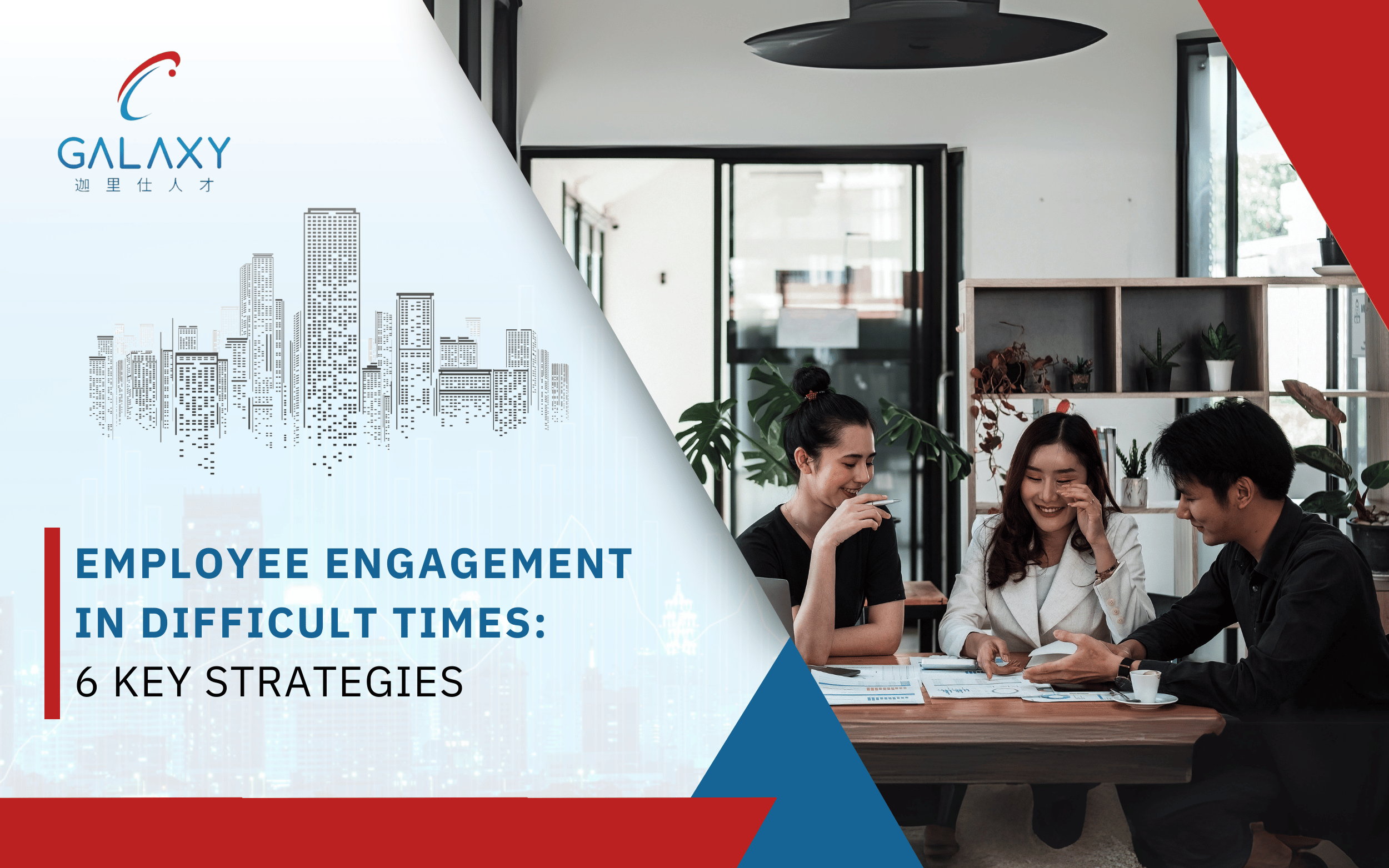Employee Engagement in Difficult Times: 6 Key Strategies

Businesses face unprecedented challenges when economic uncertainty, geopolitical shifts and global pandemics knock on the door. Entrepreneurs must keep themselves prepared for all uncertainties so that they can keep up with the pace of growth.
Furthermore, businesses that have a strong engagement and connection with employees can courageously face challenges and reduce disruptions to business operations.
However, keeping them engaged in difficult times is again a challenge that organizations face due to increased stress and uncertainty, reduced resources, fear of change, emotional disengagement, etc.
Therefore, this blog outlines the strategies to boost employee engagement in difficult times and how an Employer of Record (EOR) can play an important role in handling overseas employees in these challenging situations.
The Importance of Employee Engagement
The emotional commitment and the level of enthusiasm an employee has towards his work and the company’s goals, is demonstrated in his/her engagement within the organization.
An engaged employee goes beyond personal job satisfaction and wants to contribute towards the success of the business. He/She is committed to the aspirations of the organization whilst accomplishing personal achievements.
Therefore, an employee’s engagement with his organization directly influences business outcomes and operational efficiency.
Improved productivity, higher retention rates, better customer satisfaction and increased innovation whilst reducing operational issues, are some of the benefits a company can harness from engaged employees.
Challenges to Employee Engagement in Difficult Times
1) Economic Uncertainty:
Financial instability leading to salary reduction and layoffs, does have a strong effect on employee morale.
2) Remote Work Fatigue:
While remote work has provided flexibility, it has also affected work-life boundaries, leading to potential disengagement.
3) Cultural Diversity:
Variation in cultural norms and expectations across countries makes a one-size-fits-all approach ineffective.
4) Mental Health Concerns:
The World Health Organization (WHO) reports that depression and anxiety disorders cost the global economy US$1 trillion annually in lost productivity. Difficult times make it worse.
Strategies for Boosting Employee Engagement
1) Foster Open Communication and Feedback
Clear and regular communication helps build trust among the employees. Weekly check-ins should be conducted to understand employees’ concerns. Sharing company updates honestly, even when the news is difficult, will help strengthen the employee’s belief in the business.
By actively soliciting and acting on employee feedback, the employee feels that their input matters and these are simple exercises that can help with the cause.
2) Prioritise Mental Health and Well-Being
Mental health and well-being is gaining more and more traction over the years. In the past, many employers and employees have overlooked this aspect in lieu of the heavy focus on work accountability.
However, the same has become a priority, especially since the pandemic. Therefore, investing in employees’ mental health is no longer optional. Companies can offer Employee Assistance Programs (EAPs) tailored to meet specific employee needs.
Conducting counseling sessions, sessions on stress management and mindfulness, providing access to helplines for mental health crises, and establishing boundaries for remote work employees, are some of the simple yet important initiatives employers should consider adopting.
3) Embracing Flexibility and Fairness
Embracing flexibility during difficult times shows understanding and support for the employee’s changing needs. A shift of focus from time spent at work to quality and outcomes delivered is important in enhancing flexibility.
Hybrid work models could potentially help employees maintain a better work-life balance. Additionally, providing personalised solutions such as offering wellness sessions to help employees recharge during tough periods.
Ensuring equal access to opportunities, equal work distribution, equitable recognition and reward builds trust among the employees, enabling them to go beyond capacities to reach the company’s goals.
4) Cultivating a Positive Work Environment
Cultivating a positive work environment is essential to maintaining employee morale, engagement and productivity. Consider taking the following steps:
- Keeping employees informed about the situation and organizational plans to reduce uncertainty.
- Encourage feedback and understand employee perspectives through one-on-one meetings and anonymous surveys.
- Encourage involvement and participation in decision-making to further empower employees.
- Delegating responsibilities not only builds trust but also allows team members to develop leadership skills.
- Create a culture of inclusivity by celebrating local festivals and traditions to make employees feel valued and at the same time celebrating the diversity of the company.
5) Prioritising Learning and Development
Foster learning and development activities during difficult times. This could actually be an effective way to keep employees engaged, motivated and prepared for future challenges. Consider the following:
- Providing opportunities for professional growth shows employees that the company is invested in their career and future.
- Focusing on upskilling and reskilling helps in identifying critical skills employees need to learn in order to adapt to current challenges and future demands. This also prepares the workforce for evolving roles.
- Create on-the-job learning opportunities to assign challenging projects and roles that allow employees to develop new knowledge and skills.
6) Recognise and Reward Achievements
Employers need to acknowledge hard work and good results. This is a good morale and loyalty booster.
Recognition can be monetary such as bonuses and incentives and non-monetary such as additional leave days or public recognition during team meetings.
The Role of the EOR
An Employer of Record takes over the resource intensive work, leaving HR teams to focus on initiatives that can help maintain a positive and engaged workforce:
- by handling the HR and administrative functions efficiently
- by ensuring compliance
- seamless onboarding and efficient administration
- providing access to benefits and health resources
- facilitating global mobility and technology integration
- supporting communication and engagement initiatives through surveys and feedback
- handling workforce adjustments with care
- supporting the HR team with learning and development initiatives
Measuring Employee Engagement
To ensure the effectiveness of these strategies, measuring engagement is important for actions in the future:
- Employee Net Promoter Score (eNPS): Measures employees’ likelihood to recommend the company as a great workplace.
- Turnover Rates: High turnover can indicate disengagement.
- Feedback Response Rates: A high response rate to surveys indicates engagement and trust in the leadership.
Conclusion
Employee engagement is challenging in difficult times. It requires a proactive approach that prioritises transparency, flexibility, well-being and a sense of purpose. By adopting the 6 key strategies mentioned above, companies can work towards building an adaptive workforce.
Still seems difficult? Partner with Galaxy Payroll Group to avail the best EOR services in the APAC region.
Read our Guide ‘Should You Opt For EOR Services: 5 KeyFactors’ to know why hiring an EOR is advantageous for you.
Your Guide to Employee Engagement During Crisis
Partner with Galaxy Payroll Group for best-of-class EOR service provision in Asia Pacific. We will handle everything while you focus on important initiatives.
FAQ’S
Why is employee engagement important in difficult times?
Employee engagement is important in difficult times because it directly impacts an organization’s ability to face challenges and emerge stronger. It is crucial to retain talent and support long-term success through an engaged workforce.
How can businesses improve employee engagement in tough periods?
Prioritise employee mental health and well-being, foster clear communication and employee feedback, delegate decision making and encourage learning and development. These easy steps can help build a positive work environment.
Can employee engagement improve organizational adaptability?
Yes, employees who are strongly engaged with the organization stay committed, collaborate effectively and contribute beyond capacities to achieve organizational goals.




